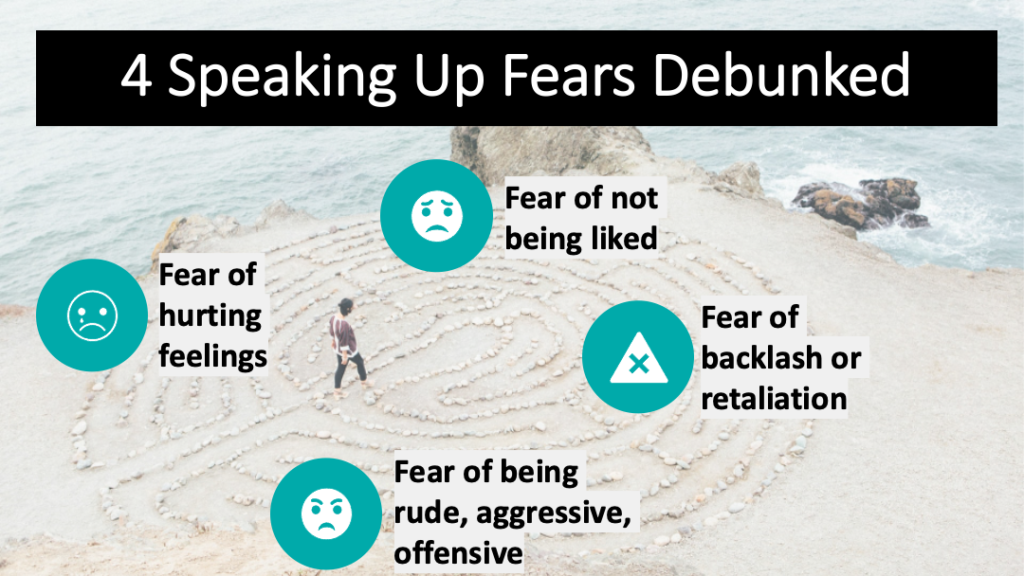And How To Overcome Them.
Sign up for our Weekly Newsletter for speaking up and assertive communication tips and inspiration to boost your career and work!
We take your email seriously and will never sell or share it.
The top reason people shy away from speaking up and expressing their needs, boundaries, desires, true thoughts, and feelings are their fears of speaking up.
This happens especially with those who don’t like to confront others or to engage in conflict because of these fears, that many are very aware of but don’t know how to overcome. Any people pleasers out there? Nice people?
When you don’t fully express yourself and speak up for yourself and for your needs over and over again, you end up feeling misunderstood and disrespected. And that leads to you also feeling overwhelmed, resentful, and frustrated.
That is why people who don’t speak up feel less connected to other people, are taken advantage of regularly, and waste most of their potential. They work more, get paid less, get less recognition, less appreciation, and still get yelled at more.
The top 4 fears of speaking up
The top four fears of speaking up are the fear of coming across as rude, offensive, aggressive, or mean; the fear of being disliked; the fear of hurting people’s feelings; and the fear of retaliation or backlash.
The good news is that these visceral speaking up fears that feel so real are in reality unjustified. You can speak up and still avoid all the negative things on the other side of those fears.
Here the 4 top speaking up fears debunked.

Fear of coming across as rude, offensive, or aggressive
On the top of the list of fears, is the fear of coming across as mean, offensive, rude, and aggressive. This fear is painful for people who have a strong identity of being kind and caring.
Most people don’t know how to speak up in a way that is not rude or aggressive. When they speak up, they get overly combative and emotional which creates a very negative atmosphere.
What most people don’t understand is that there is a way to speak your mind and be assertive in a respectful, polite, and kind way every single time, no matter how difficult is the conversation topic.
For example, if you need to fire someone or give them negative performance review, you can still do so in a way that shows to the other person that you are kind, empathetic, and caring and that makes them feel understood.
Learn to be respectful and kind when you speak up and you will no longer have to fear coming across in the wrong way.
Fear of hurting people’s feelings
Many believe that if they speak up, they will hurt people’s feelings. But the reality is that people will feel hurt if they feel like we don’t care about them, we don’t consider their feelings, and we don’t treat them with dignity and respect.
You can be kind and still speak up in a tough way. When you speak up, show empathy, show that you care about them, and acknowledge their feelings and hardships. That is the part you have control over.
Another problem is that nice people feel like they have to take responsibility for other people’s feelings. That is why they get very uncomfortable when people seem to be unhappy with them or around them.
Feelings are a very personal experience. Two people could experience the same situations, like getting fired under the same circumstances, and one can be optimistic and energized while the other one gets into depression.
When people listen to you speak up, they will interpret what you said based on their own set of experiences, beliefs, values and insecurities, and will come up with a feeling. That is their individual experience.
That is why it is important to focus on your part: demonstrating empathy and acknowledgment when you speak up. No matter what the person feels, they will know you are coming from a positive place.
Fear of not being liked
Many people believe that if they speak their mind authentically, people won’t like them anymore.
The truth is that when you speak up with assertiveness authentically and respectfully, people will trust you more. Over time, people can tell when you have a nice façade on to look good and will disconnect from you.
For example, when you start dating someone, both you and the other person are usually showing your best self and actively hiding the things you don’t want the other person to find out. But when you get married and go through hardships together, you learn who that person really is, build trust, and with that you are able to connect at a deeper level.
Not only that, when you speak up authentically and stay true to yourself, you’ll attract people who like you as you are, and push away those who are just interested in you because they want something from you. That is better for everyone and is more sustainable for the long term.
Speak your mind more, not less, and in a way that is considerate and respectful towards others, and you’ll find that most people will like you and connect with you even more, and you’ll repel those who just want to take advantage of you.
Fear of retaliation and backlash
Many fear that if they speak up with a superior or colleague, that there is a big risk of retaliation and backlash such as harsher evaluation, unfair criticism, shaming, passing over for promotion, exclusion from important information or projects, and speaking poorly of them to senior management.
Most people don’t try to hurt others just because they spoke up for themselves. Retaliation and backlash usually happen when people feel hurt, attacked, exposed, threatened, manipulated, at greater risk, or if they feel you are lying.
And that misconstrued interpretation of what you say as being rooted in evil intent is fueled by muddled communication.
That’s why lack of communication (not speaking up enough) can actually increase retaliation and backlash.
The solution is to increase, not decrease, communication and clarify not only your message, but also your intent as much as possible. Also be careful to match your non-verbals to your verbal communication so that your non-verbals don’t shout ‘I’m trying to get you.’
Once you start to speak up more and in the right way, you’ll notice that instead of being disliked, coming across in the wrong way, retaliation, or hurting others feelings, people will respect you more and connect with you at a deeper level.
Get started with this free crash course on how to be assertive without being rude or these other resources here.
Visit our Assertive Way website here for more useful resources.
Sign up for our Weekly Newsletter for speaking up and assertive communication tips and inspiration to boost your career and work!
We take your email seriously and will never sell or share it.
“You cannot be afraid to speak up and speak out for what you believe. You have to have courage, raw courage.” – John Lewis
